Verdict
The all-new Vauxhall Mokka is a striking-looking creation that will win admirers, but while it is more accomplished and refined on road than before, it’s not a match in this area for the Ford Puma. This, and its cramped rear cabin are likely to mean it continues to be a model that sells on image and design instead of more tangible benefits like practicality and fun. That’s not an uncommon proposition in the small SUV market, though - so assuming Vauxhall gets its monthly finance deals in place to bypass what looks like a high list price, the Mokka’s sales success should continue.
Vauxhall has some classic nameplates in its line-up - Corsa and Astra being the prime choices. But Mokka is almost of equal importance to the British firm these days, thanks to the burgeoning market for small SUVs (it increased again last year, even with Covid).
Indeed, the original Mokka and its facelifted version, the Mokka X, played their part in the initial take-up of small SUVs in the UK. The first iteration was launched in 2013 and since then, Vauxhall has sold over 200,000 examples. Across Europe, the tally is around one million.
Those customers will have been attracted by the elevated driving position and also some sharp design work by Briton Mark Adams and his team. But it’s safe to say that dynamically, the Mokka as we know it was a bit of a disappointment, with a relatively old chassis and wheezing engines creating a car that was neither rewarding to drive nor particularly refined.
The small SUV market is more crowded and competitive than ever, though, so if this all-new Mokka is to succeed, it needs to be a more complete package.
Vauxhall certainly hasn’t pulled any punches on the new car’s styling, since the Mokka not only marks a radical shift away from what’s gone before, but also introduces a whole new design language for the company. This is most evident at the front, where an all-new grille and headlight treatment - dubbed Vauxhall Vizor - makes its debut. There’s a lot of influence from the well-received GT X Experimental concept, too, giving the Mokka a distinct crossover look. It’s actually slightly a centimetre or so shorter than the old model, but smaller front and rear overhangs mean that the wheelbase is able to stretch, albeit by just two millimetres.
The underpinnings have the potential to mark a quantum shift for the badge too, because this Mokka sits on Stellantis’s CMP platform - the same base as everything from the Peugeot 208 to even the latest Citroen C4. That means a choice of 1.2-litre petrol power in a couple of outputs, or a single 109bhp 1.5-litre turbodiesel.
It also brings a pure-electric version, the Mokka-e, which gets a 134bhp electric motor and a 50kWh battery to deliver a WLTP certified range of up to 201 miles between charges. It’s in this area where Vauxhall hopes the Mokka can really succeed as a slightly funkier, more upmarket, tech-led stablemate to the recently updated Crossland, which is meant to focus more on practicality.
Vauxhall’s trim level hierarchy has been simplified a little for the Mokka, but it’s still complex compared with rivals. For conventionally powered examples the range starts with SE (in 99bhp petrol or with the diesel); this gets cruise control, 16-inch alloy wheels, a six-speaker audio system with a seven-inch touchscreen display and Android/Apple connectivity, a seven-inch digital instrument cluster, and LED headlights and tail-lights.
Step up to SRi and your engine options are widened by a 128bhp version of the 1.2-litre three-cylinder turbocharged petrol engine, equipped with either a six-speed manual gearbox or an eight-speed auto. This model gets 18-inch alloys, a contrast black roof, automatic wipers, heated front seats, rear parking sensors and rear-view camera, an auto-dimming rear-view mirror and LED front fog lights.
The same engine line-up can also be ordered with SRi Nav Premium, which includes many of the same key features as SRi but adds keyless entry and start, and front parking sensors, as well as increasing the screen sizes to 10-inches (for the infotainment) and 12-inches (for the instrument cluster), and bringing navigation.
Elite Nav and Elite Nav Premium get the same four-strong line-up of engines; these two variants are focused more on luxury than the SRi’s sportiness, so they get 17-inch bi-colour wheels and an extra pair of USB sockets for rear-seat passengers.
The regular range-topper will be Ultimate Nav, available with just the higher-powered petrol in automatic form, and the diesel (which is only available as a six-speed manual). It’s based on Elite Nav and gets 18-inch alloys, the larger instrument panel and infotainment displays, tinted rear windows, a wireless smartphone charger, front and rear parking sensors, matrix LED headlights, Alcantara seat trim and a black headliner.
Vauxhall is bringing the car to market with a high-spec, limited run Launch Edition too which takes Ultimate Nav and adds leather seat trim, a massage function on the driver’s seat and advanced parking assist.
Here we’re driving a European spec version of the new Mokka, with the high-powered 128bhp petrol engine and automatic gearbox. It’s the equivalent of SRi Nav Premium trim - pretty close to what Vauxhall insiders expect to be the best-selling version in the range. It’s far from the range-topper but still comes with a list price of more than £27,000 - punchy, when Renault will sell you a similarly powered Captur S automatic for £25k.
This is the most potent version of the Mokka, but it never quite manages to feel fast. The EAT8 gearbox is as smooth as ever - and better at low speeds than any of the VW Group’s dual-clutch units. But you’ll need to push the engine’s revs to the point where it gives you that unmistakable three-cylinder growl if you want more rapid progress - almost as if the Mokka feels heavier than its sporty shape suggests. That’s a shame, because at lower speeds and at a cruise, the otherwise well-proven motor fades away into the background, and is drowned out by road roar from the chunky alloys.
The ride is at its best around town - a strange trait, perhaps, on 18-inch wheels. But at lower speeds the CMP chassis seems able to cope with deep potholes without too much trouble or noticeable rebound. This feeling doesn’t deteriorate beyond recognition once you’re on faster roads, but at higher speeds the suspension can struggle to cope with the frequency of inputs, resulting in a bit of shimmying over badly scarred surfaces. It’s not a bad compromise overall, mind, especially when body roll is kept largely in check unless you really start to misbehave. Do that and the nose will wash out into understeer anyway.
Like pretty much every CMP platformed car we’ve tried to date, then, this car is not about driver involvement; the steering is consistently weighted at least (more so than some Peugeots and Citroens using CMP) but desperately short on communication. And if you flick the driving mode switch into Sport, the sound enhancement is really just like someone flicking the volume knob up a couple of notches – noisier, then, but not necessarily better.
The cabin is almost as big a step for Vauxhall as the front-end styling though, with the conventional instrument panel replaced by the aforementioned digital cluster and a crisp infotainment screen that is quick to respond (good) but saddled with responsibility for controlling the heating and ventilation (less good). The navigation is standard pre-Stellantis PSA fare - not bad, then, but easily outshone by either the (standard) Android Auto or Apple CarPlay phone hook-up.
The finishes on offer are smart enough, if a bit of an ode to piano-black lacquer, which adorns everything from the dashboard surround to the base of the centre console. An attempt to reproduce carbon-fibre weave on plastic panels isn’t likely to fool anyone, either. But SRi Nav brings a flash of red metallic colour to break all of this up, plus there are padded materials in all of the right places; the overall effect is better resolved than many of Vauxhall’s recent layouts and feels higher quality.
The front has ample space for two adults, although their view out might be impaired by noticeably thick A-pillars. The rear cabin, meanwhile, is a polite reminder of the car’s focus; put simply, there’s not a great deal of knee and legroom in there for grown-ups, and if a six-footer happens to be sitting in front, it’ll be downright uncomfortable.
At least the boot is a fair size, at 350 litres - although this is comprehensively trumped by the capacity of the Renault Captur, and the Mokka doesn’t offer that rival’s trick sliding rear bench, which allows you to prioritise either passenger space or the load bay. Suffice it to say that if you tell your Vauxhall sales rep that space is a priority, they’ll probably give you a gentle nudge in the direction of a new Crossland.
| Model: | Vauxhall Mokka SRi Nav Premium 130PS petrol auto |
| Price: | £28,620 |
| Engine: | 1.2-litre 3cyl turbo petrol |
| Power: | 128bhp/230Nm |
| Transmission: | Eight-speed automatic, front-wheel drive |
| 0-60mph: | 9.2 seconds |
| Top speed: | 124mph |
| Economy: | 47.1-47.9mpg |
| CO2: | 133-137g/km |
| On sale: | Now |
from Sitewide RSS feed https://ift.tt/3trAFC8
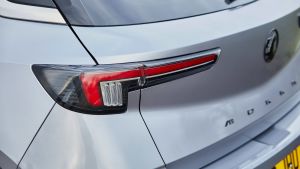
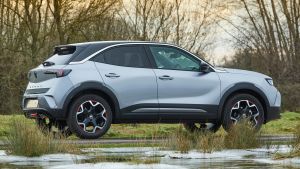
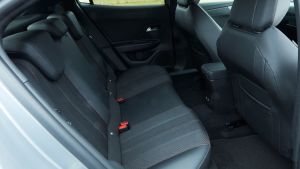
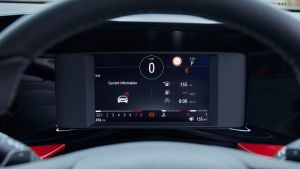
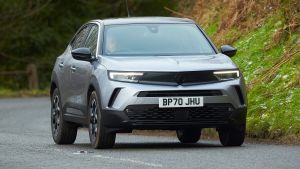
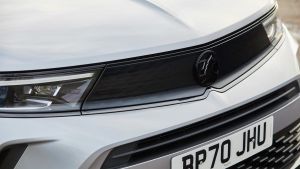
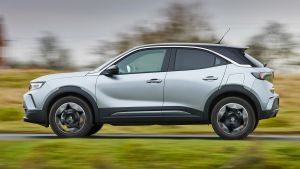
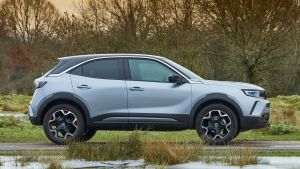
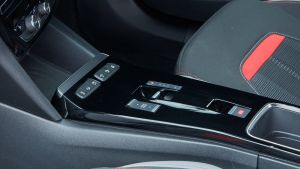
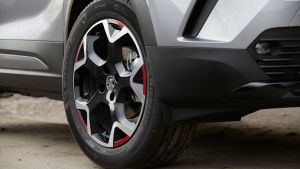
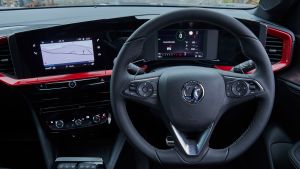
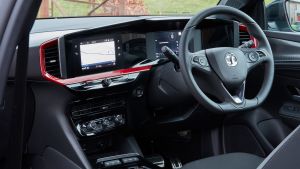
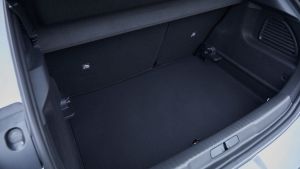
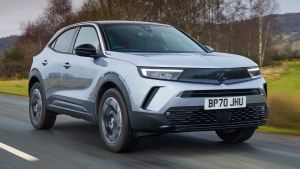
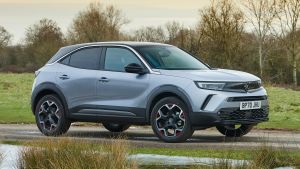
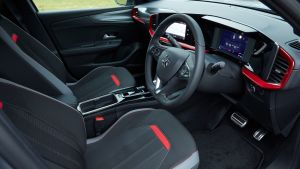
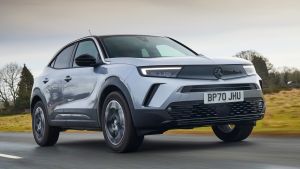
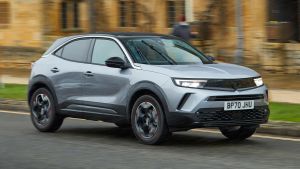
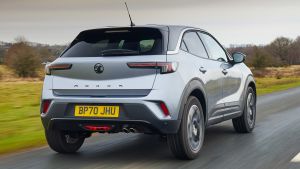
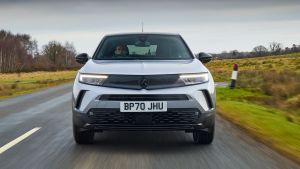
No comments:
Post a Comment